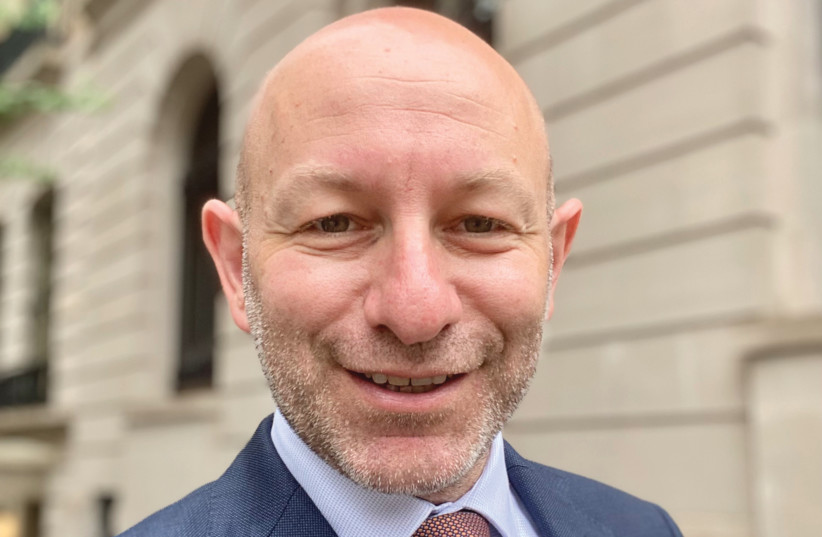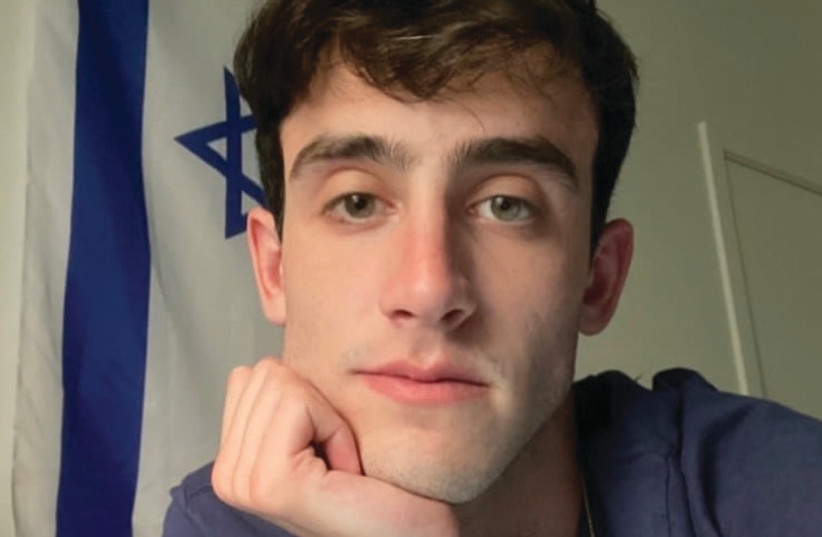“The results may or may not be to your liking, but the vote of the Israeli people should be respected,” President Isaac Herzog told a group of 1,200 American Jewish leaders during the Jewish Federations of North America (JFNA) General Assembly last week.
Herzog spoke a day before Israel’s elections and was a preview of what these American Jews were about to witness the following day: Likud chairman Benjamin Netanyahu and his supporters had received the 61 seats needed to form a coalition. His partners will be the haredi parties United Torah Judaism and Shas, in addition to the Religious Zionist Party, comprised of two central leaders, MK Bezalel Smotrich and MK Itamar Ben-Gvir – both of whom are considered extreme Right, having spoken out against LGBTQ rights and Arab-Israelis, with occasional remarks veering into racist territory.
Jewish organizations in the Diaspora haven’t been able to calm down, nor have many Israelis, since the results of the election were finalized. Many of them have been extremely vocal about the results, while others are remaining silent.
“We will certainly continue to work with Israel. There are almost 10 million Israelis, but we will not meet with Ben-Gvir or Smotrich,” a prominent Jewish leader of a large European Jewish community shared with the Magazine. He explained that if the organization that he heads will need to be in touch with the professional staff of the ministries the RZP leaders ultimately head, they will probably work with them, but “we will not be in any relationship with them. We will respond to incidents as they occur,” he said, emphasizing they will not speak to those whom they see as racists and against minorities.
“It is very important to clarify the depth of despair felt by a large part of the community in Europe over these election results,” the European Jewish leader said. “There is a certain desperation amongst our community. There is, of course, respect for the democratic process and an understanding that we aren’t Israeli citizens. The values of the Jewish community are different here,” he said, and added that, interestingly, “from the Orthodox religious Jews to left-wing progressive Jews, there is very strong despair.

“I’m afraid that the Israeli Embassy here still doesn’t grasp the magnitude of this crisis. There is a crisis here that is going to blow up not only in our country, but worldwide.”
“I’m afraid that the Israeli Embassy here still doesn’t grasp the magnitude of this crisis. There is a crisis here that is going to blow up not only in our country, but worldwide.”
European Jewish leader
He disclosed that a few Jewish philanthropists have shared with him that they are reconsidering whether to fund projects in Israel. “They told me they will put their money elsewhere, such as our local Jewish community, or towards Ukrainian refugees. There will definitely be a philanthropic response.”
Noting he was “worried there will be young people who will not want to come to Israel,” he cautioned those contemplating cutting their ties with Israel that “50% of Israelis did not vote for them [Ben-Gvir and Smotrich].”
“It is important to further strengthen the relationship with liberal organizations and initiatives in Israel,” he concluded. “I tell my constituents, ‘Do not despair. On the contrary, take a deep breath and hold a more liberal opinion.’”
“I WOULD say that there’s a great amount of fear that this new Israeli government, which is obviously not yet constituted, will create greater separation between American Jews and Israel,” a senior American Jewish professional working in a major mainstream Jewish organization shared this week.
Asked if Jewish organizations are already debating whether to meet with these right-wing politicians once they become ministers, he said that those who may possibly be discussing this are “the ‘J Streets’ of the Jewish community,” meaning that only the organizations accustomed to criticizing Israel will boycott these politicians.
“For many of them [American Jews] who are on the liberal side, they already see Netanyahu as a conservative figure and somebody who they associate with going after [US president Barack] Obama and other things like that. So just for them to get an inkling of information that Netanyahu is going to be the most moderate party within his coalition is going to have an impact on them.”
“The pro-Israel organizations are not going to stop being pro-Israel or supportive of it,” he clarified. “They’re still going to ask for the same amount of aid that Israel gets, and they’re still going to send their kids to Israel. But it certainly has a chance of weakening these ties if they see an Israel that doesn’t seem to align with their values.
“I also hear voices of frustration at the Israeli Left, that they failed to coalesce, work together and that they managed the situation very poorly politically. There’s no question that sophisticated people understand the vote wasn’t so far off; it was the Right that played better politics. But this is all in the background with an overall fear that these figures, who previously had been seen as untouchable, are now suddenly not only touchable but government figures.”
He stressed that “you can’t underestimate the power of Tom Friedman’s writings with American Jews,” he said of The New York Times senior commentator who is also a member of a Conservative synagogue in the US. Friedman wrote an op-ed titled “The Israel We Knew Is Gone” after the election results were finalized.
“A fundamental question will roil synagogues in America and across the globe: ‘Do I support this Israel or not support it?’ It will haunt pro-Israel students on college campuses,”
Tom Friedman
“A fundamental question will roil synagogues in America and across the globe: ‘Do I support this Israel or not support it?’ It will haunt pro-Israel students on college campuses,” Friedman wrote.
Regardless of what Israelis think of Friedman or his views, they’ve been reading him for the past 30 years, this American Jewish professional shared. “For him to make an announcement that ‘this is no longer the Israel that he supports’ resonates with them [American Jews]. It has an outsize impact; it’s worth more than 10 articles in the press [from] the [Gaza] border. As much as they claim to hate The New York Times, they’ll read it.”
Asked if he and other leaders of US Jewish organizations are planning to create new educational tools for their employees and volunteers, he noted there are different plans in progress – but wouldn’t share the details. “I think everyone will have done it in the pro-Israel camp,” he explained. “It goes beyond just talking points; we have to consider whether we bring in more critics of the Israeli government, just to show that those voices are out there, and so we’re fighting for this type of democratic dialogue.”
“I DON’T know the range of what we have to do, but it won’t be business as usual,” a head of a pro-Israel organization in the US told the Magazine. “We’re going to have to create a new way for Israel’s supporters to advocate for Israel because some of the previous arguments aren’t going to work. They’re not going to sound credible.
“We’re going to have to create a new way for Israel’s supporters to advocate for Israel because some of the previous arguments aren’t going to work. They’re not going to sound credible.”
US pro-Israel organization head
“I don’t know what the plans are. We’re still digesting.
“Personally,” she added, “I think they’re trying very hard not to criticize the Israeli government because they don’t want to get into that situation. Privately, people have told me that they are worried about how they’re going to be able to defend the government, which has some of these [extreme] figures.”
Many Jewish organizations published statements relating to the upcoming right-wing government. There were those such as the JFNA or Conference of Presidents of Major American Jewish Organizations that took a more moderate approach and didn’t mention the elephant in the room. Obviously, there were also a small number of right-wing organizations that supported Netanyahu and his efforts. Yet the loudest reactions were those criticizing the likely establishment of an extreme right-wing government with personalities such as Smotrich and Ben-Gvir.

“Israel had elections, and this is the outcome of it. We respect that, but for those of us who speak in defense of Israel’s legitimacy on college campuses, the idea of people like Ben-Gvir and Smotrich in prominent roles is a problem,” Rabbi Rick Jacobs, president of the Union for Reform Judaism, told the Magazine while visiting Israel for the Jewish Agency’s Board of Governors meetings in Tel Aviv.
In Jacobs’s eyes, nominating Ben-Gvir as public security minister and Smotrich as education minister is “like letting a pyromaniac run a fire station.”
Asked if he would meet the two as ministers, he replied that he “can’t imagine them asking for a meeting. They’ve been in public life for years and haven’t been knocking on my door. In addition, they’ve been demonizing us.”
Jacobs asked to pass along a message to the former and future prime minister: “Netanyahu, please do not forget American Jews, particularly liberal and progressive Jews. We love Israel and stand up for it daily. We have differences between us, but please don’t trade us in for the Evangelicals.
“Please make sure we’re part of the discussion.”
“Netanyahu, please do not forget American Jews, particularly liberal and progressive Jews. We love Israel and stand up for it daily. We have differences between us, but please don’t trade us in for the Evangelicals. Please make sure we’re part of the discussion.”
Rabbi Rick Jacobs
IN THE words of a prominent Orthodox rabbi in the Diaspora, Ben-Gvir and Smotrich are “going to have to moderate themselves” when in government. “There’s that old saying about Israel’s first prime minister David Ben-Gurion, who would say, ‘Now that we have sovereignty, it doesn’t matter what the world thinks,’” adding that from his point of view as a Diaspora leader, “it’s a misguided view. It belongs in the past.
“We have to be careful how things are perceived, and they [the new Israeli leadership] have a responsibility as Jews who represent Torah [to] not cause a hillul Hashem [desecration of God’s name]. They must now be careful how they conduct themselves,” he told the Magazine.
“I can’t say this in public, but I wish to find the time to say this to them [Ben-Gvir and Smotrich] privately, ‘Now that you’re in government, you’re representing the State of Israel and, more importantly, you’re representing the Torah.’
“I’ve found that Israeli politicians are particularly naive when it comes to understanding the world – even people who appear cosmopolitan. I don’t think they fully grasp the danger of the apartheid accusation. I don’t think they understand the BDS [Boycott, Divestment and Sanctions] movement and how serious it is.”
Yet according to one senior Jewish leader active in Israel-Diaspora relations, there seems to be “mass hysteria” among many Diaspora Jews at the prospect of the Israeli government makeup.
“Israel is a sovereign nation, and there needs to be greater respect shown towards the democratic will of the Israeli people. Instead of admonishing Israelis and threatening to boycott certain prospective members of the forthcoming government before they have even been sworn in, Diaspora Jewry leadership should instead reach out, engage and express their concerns in a respectful manner.”

Pro-Israel influencers
The upcoming formation of the government is not just an issue for Diaspora Jews and Jewish organizations, but also for pro-Israel advocates – some of whom aren’t even Jewish. These advocates, mainly online influencers, always highlight Israel as a country that is inclusive towards its Arab minority and supports LGBTQ rights – but Ben-Gvir and Smotrich have been quoted in the past speaking pejoratively about these groups.
“You really have to take things in the right proportion. The Arabs will not be expelled from the country and there is no need to hide in basements as if there is no future for liberal Israelis,” says social media influencer Yoseph Haddad, a Christian Arab-Israeli.
“You really have to take things in the right proportion. The Arabs will not be expelled from the country and there is no need to hide in basements as if there is no future for liberal Israelis.”
Yoseph Haddad
He, of course, thinks negatively of the “very problematic and racist statements and actions Smotrich and Ben-Gvir” have said and done against Arabs, but “on the other hand, you need to calm down: Israel is stronger than any of its politicians.”
Haddad repeated that maxim a few times during the interview: “The State of Israel and its institutions are much stronger than any politician.”
Asked if he believed Ben-Gvir’s and Smotrich’s statements of reconciliation, he said, “I had the chance to interview Ben-Gvir on a radio show. I asked a simple question: ‘If I believe that an Arab who throws a Molotov cocktail at an IDF soldier is a terrorist, is a Jew who throws a Molotov cocktail at an IDF soldier also a terrorist in your eyes?’ He didn’t answer. That’s the whole story for me.
“I said after the interview that the day Ben-Gvir says ‘a terrorist is a terrorist,’ regardless of his background, then he won’t be considered extreme. I say that both these types of violence are acts of terrorists. Therefore, how can he, who loves the IDF, say such a thing?”
Haddad went as far as stating that if this government will fight the violence in the Arab sector, Arab-Israelis will support it.
“In my opinion, not enough is being done with crime in Arab-Israeli society,” he said. “Itamar Ben-Gvir says he will help fight crime in Arab-Israeli societies. When he will serve as minister, he will have to prove himself: If he really makes a change in Arab-Israeli society, no one will talk about his past statements. If Ben-Gvir brings the long-awaited change in security, you will see pro-Ben-Gvir videos by Arab influencers on TikTok. I’ll be the first to support him if he succeeds.”
Haddad also thinks that some of the criticism of the future government is hypocritical. “I want to remind everyone that anyone who opposes this government because there are members who are anti-LGBTQ: The current government has a member in the coalition alongside [gay] Health Minister Nitzan Horowitz and other [gay individuals] – Ra’am MK Waleed Taha. Taha clearly said, ‘I think gays are deviant and should go to psychiatric treatment.’
“He also added that ‘there is no such thing as gays in the Arab society.’ Meretz and Labor sat in the same government with him. Why are they okay to sit in the government but Ben-Gvir isn’t?”
“I DON’T see any drastic impact with respect to the geopolitical situation. Israel’s detractors and enemies don’t have much regard if it’s a left-wing or right-wing government,” said Arsen Ostrovsky, leading Israeli human rights attorney and CEO of the International Legal Forum, a global network of lawyers combating antisemitism and standing up for Israel in the international legal arena.
Ostrovsky, who made aliyah from Australia, is also a social media influencer. He said Israel’s detractors “object to our very existence as a Jewish state. Israel has had governments of all political persuasions in the last three decades, and the one constant has been Palestinian terror and rejection and its enablement in the West.”
“I would add, during the course of the last year and a half, we have already had some major strategic challenges to contend with, including apartheid allegations, BDS campaigns and the UN, notwithstanding the makeup of the outgoing government. Whereas we also had the Abraham Accords immediately prior and unprecedented engagement with the Arab world.
“Israel will always have to contend with diplomatic, security and legal challenges. Yet, at the same time, we need to remain firm and unwavering in standing up for our rights,” he affirmed.

“Voting for the man who had a portrait of a mass murderer hanging in his home is absolutely shameful for Israel and for the Jewish people.”
Blake Flayton
“VOTING FOR the man who had a portrait of a mass murderer hanging in his home is absolutely shameful for Israel and for the Jewish people,” new American oleh and social media influencer Blake Flayton tweeted on Election Day, referring to Ben-Gvir’s photograph of Baruch Goldstein, perpetrator of the 1994 Cave of the Patriarchs massacre in which 29 Palestinian worshipers were killed.
Flayton is fresh out of college, having established the New Zionist Congress while a student to promote Zionism on campus. An advocate for LGBTQ rights and a member of the community, he reflected, “Israel is a very special place for a lot of LGBTQ Jews,” noting that when LGBTQ Israeli Jews participate in the Jerusalem or Tel Aviv pride parades, “they get to feel connected to both of their identities; their gay identity and also to their Jewish heritage and Jewish culture. They’re in the Jewish state that allows us to sort of blend those two things together.
“Whereas in the Diaspora, more often than not, they [the two identities] sort of feel at war with each other. There’s not a lot of places to feel in touch with both sides of yourself if you’re more of a secular Jew, wanting to have a relationship with your Jewish identity, but also proud of who you are and your placement in the queer community as well.
“It feels like part of your family is turning their back on you,” he said of the upcoming government. “When you see so many seats in the Knesset go to Smotrich and Ben-Gvir’s party, people who have made it public, their open antipathy and disdain for expressions of gay pride happening in Israel… it’s not the Israel that I want. It’s not the Israel that a lot of American olim that I know who came from liberal Jewish families want.”
He added that “this doesn’t make it any easier for us to defend Israel,” but at the same time, “of course we’ll keep on defending Israel because we’re committed to the truism that anti-Zionism is antisemitism. We stay true to the belief that the Jews have a right to self-determination in their ancestral homeland, point blank period. It’s just an extension of the conversation when we’re talking about what we want that homeland to look like.
“I spoke to many young American Jews who texted me that they were rattled because they consider themselves progressives and always want to be defending the Zionist spirit of Israel. We talked and got our heads together and basically came up with what I told you about defending Zionism, and it’s about defending Israel.
“We want to continue to encourage people to make aliyah from America. I tell people they should move here, that’s what I did so I can have an actual say. Speak Hebrew, acclimate into the culture, into society – that’s the most Zionist thing you can do.”
A few years ago, former Israeli ambassador to the US Michael Oren called for promoting a program that would encourage one million progressive US Jews to make aliyah. When posed with the idea of this type of program, Flayton said, “Be’ezrat Hashem [with God’s help],” and laughed. “This is something that I would definitely sign up for,” he said, adding that “I would sign up for any initiative that got more American Jews to make aliyah.
“Jews in the Diaspora, in America specifically, who are more secular like myself are running out of ways to express our Judaism. Jewish culture in the [American] media is increasingly campy or ‘lampoonish’; synagogue attendance is declining for all religions in the US. Jewish cultural gatherings are declining because of the pandemic. We don’t have faith; we don’t have a connection,” he said, pointing to why aliyah was a good option for liberal secular Jews.
“Moving to Israel is a wonderful opportunity to kind of reinsert yourself back into the Jewish story and say ‘I’m here. I’m deciding what becomes of the Jewish nation. I have a direct stake in it now. I’m an Israeli. I’m speaking Hebrew. I’m sending my children to the army. I’m studying here and working here.’ It gives a tremendous meaning to your life. That’s what I’ve found over the last couple of weeks since making aliyah.”
Blake Flayton
He concluded, “Moving to Israel is a wonderful opportunity to kind of reinsert yourself back into the Jewish story and say ‘I’m here. I’m deciding what becomes of the Jewish nation. I have a direct stake in it now. I’m an Israeli. I’m speaking Hebrew. I’m sending my children to the army. I’m studying here and working here.’
“It gives a tremendous meaning to your life. That’s what I’ve found over the last couple of weeks since making aliyah.” ■
